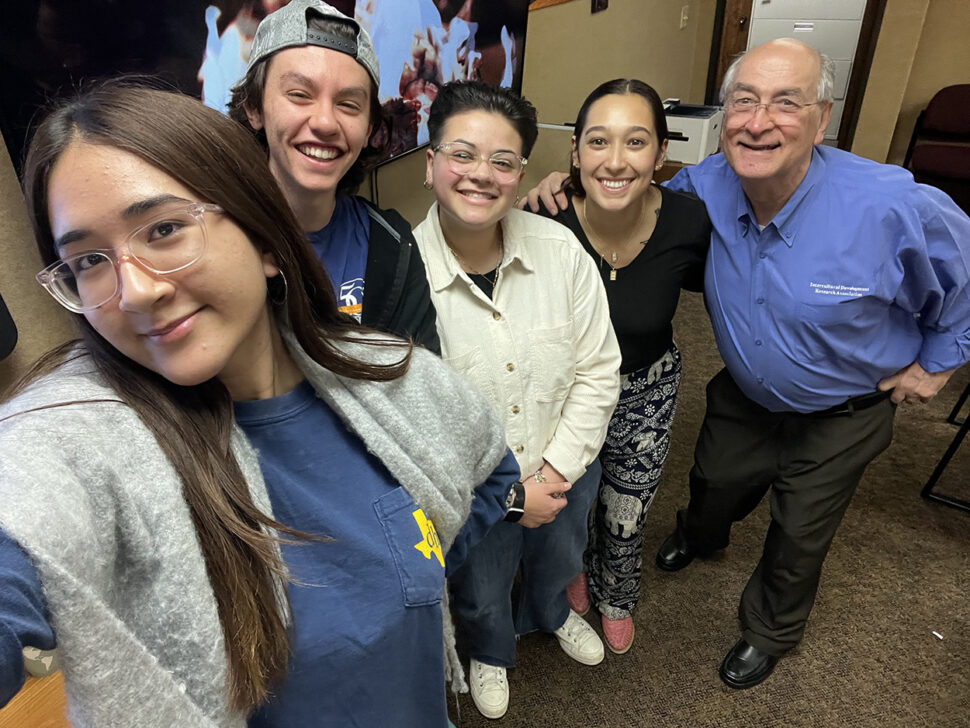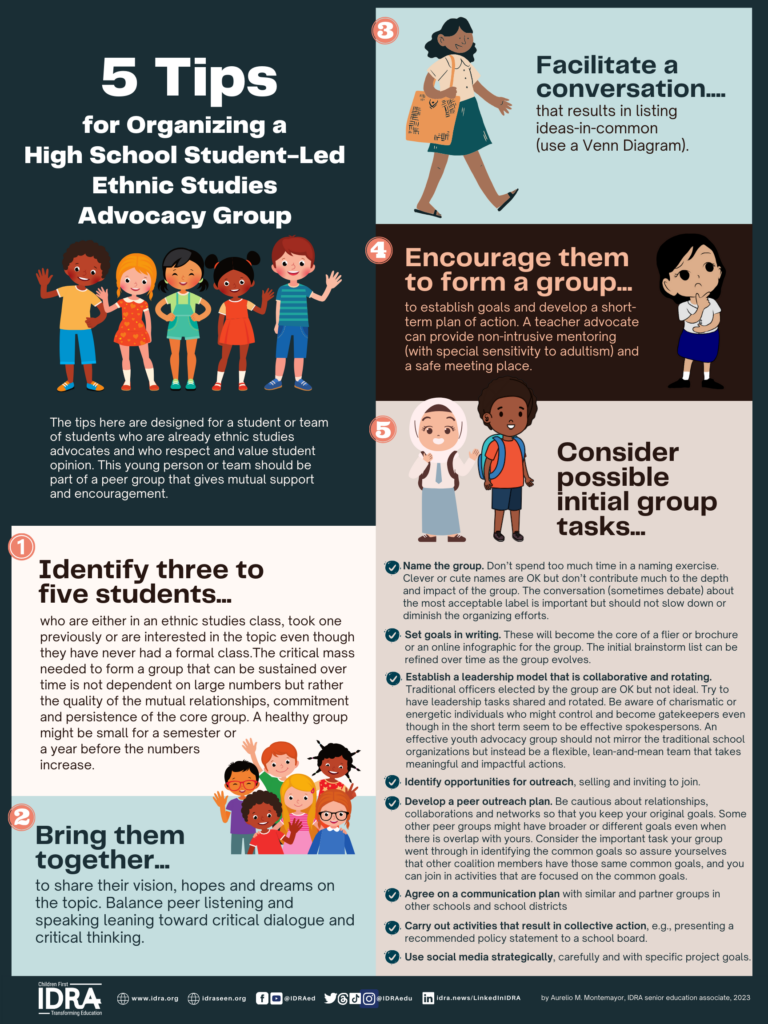• By Marcela Hernández, Jonas Lokensgard & Hannah Rosales • IDRA Newsletter • February 2024 •
Editor’s Note: In March of 2023, IDRA selected three students from a San Antonio high school for a project-based learning effort organized by the National Center for Youth Law. The students led a research project, MAS for Our Schools, to determine the status of Mexican American Studies (MAS) in their school district and how to help it grow. In this article, the three student researchers, currently high school seniors, reflect on their shared experiences in this project. [Update: IDRA published their report in March 2024.]

Student researchers, Hannah Rosales, Jonas Lokensgard, Marcela Hernández, with their IDRA mentors, Christina Quintanilla-Muñoz, M.Ed., and Aurelio M. Montemayor, M.Ed.
Students’ Reasons for Participating
We wanted to become involved in this project for several reasons. As a team, we understood the importance of a project like MAS for Our Schools, and we were influenced by different motivating aspects toward this opportunity.
We are members of the Mexican American Studies Student Association (MASSA), a club at our school that was started and is run by students who are passionate about MAS. Our involvement in MASSA gave us a common reason for participating. And it gave us a common curiosity about the status of these studies in our schools around us.
Marcela stated, “The goal that this project presented was to spread the awareness of MAS and hopefully get that seed planted and get other schools to implement a MAS class.”
There were strong connections to the sense of community that would be felt, with the succession of this project, which pushed us to sign up for the student researcher position.
Another aspect that motivated us to become involved with IDRA was the contribution a project like ours would have on our academic future.
Hannah said: “Research projects are usually done by adults, people with degrees. So, I thought having a published work and also learning from different techniques that I’m not aware of would really help me.”
As first-time student researchers, we concurred that this was a special opportunity rarely offered to students our age. We experienced challenges to our work ethic and had to extend and improve our ability to collaborate and communicate.
Hannah said: “As a high school student, specifically, you’re not usually doing these things. You’re not usually working on these kinds of projects.”
“If you want to help students, realize that the most important thing you can do is listen to them and understand what they are asking of you.”
– MAS for Our Schols student researchers
Reflections on the Project
During the project, we learned how to construct a survey and interview questions from scratch. We conducted surveys and focus group interviews. We analyzed the results and arrived at conclusions about the subject of the project.
We had adult support from IDRA that gave us the freedom to create and carry out the activities. Our opinions, ideas and points of view were respected without, at the same time, abandoning us to dead-end conversations of unresolvable differences.
We had moments of doubt about the project’s outreach, yet we persisted and adapted to make the best use of the data we collected and the connections we made. At the end, we collectively give gratitude for this amazing opportunity. This project affected us beyond our original imagination.
Marcela said: “It’s just so surreal to see. If this didn’t happen, then I wouldn’t have known what I wanted to do. It clarified the path I’ve chosen for my college work.”
Being a part of this project allowed us to have unique experiences that opened our eyes to new possibilities for our future. As a collective, we learned a lot of things that proved more difficult than once perceived, such as actively listening, facilitating interviews, interpreting data, and networking. However, these difficulties proved that persistence is key to success.
A key finding was that MAS is bigger than just a class, and many people are very passionate about it.
Hannah explained: “MAS is not just this little class that is offered at a school. It’s much deeper than that. Many people feel deep connections to it and are passionate about it. And that’s why there’s such a push for it.”
Furthermore, as part of a campus that has a successful MAS program, it is our responsibility to spread the joy and enlightenment the class evokes. Even though there are some successful classes with sufficient student enrollment, much support is needed for extending and expanding the classes to other high schools.
Challenges Student Researched Faced
We struggled to find teachers to participate in our interviews. This was a large setback because to gain insight into the experiences of being a MAS teacher, we needed to interview them. With help from our mentors, we eventually had teachers join our focus groups. But it was disheartening at first to see people unwilling to help us. If you want to help students, realize that the most important thing you can do is listen to them and understand what they are asking of you.
Lessons Learned
As high school students without any background in research, we understand how something like this could be overwhelming to students who may feel that they are not prepared or have the skills for the job. We felt this way, but with time as the project progressed, we learned from our project facilitators, Aurelio Montemayor and Christina Quintanilla-Muñoz, and from our mistakes to create something we are proud of.
Get our free infographic, 5 Tips for Organizing a High School Student-Led Ethnic Studies Advocacy Group
Advice to Students
Some advice we have for students interested in working on youth action research projects is to be bold and dedicated. To create work meant to inform others and make a difference, you have to be dedicated to the topic at hand.
Marcela said, “You can tell that each of us is dedicated and has so much love for this project that we put so much of our time and effort into this.”
We have put immense love and time into this project because as students, we know first-hand the power of MAS in schools and the community. Along with the passion, having thoughts of inadequacy is normal. Yet, it is important to step outside of your comfort zone. Recognize that to succeed in the project, you have to put yourself out there and maybe do some things that you usually wouldn’t.
Jonas added: “Before I got involved in this project, I had decided to join the MASSA club, thinking ‘I’m going to go to a club (MASSA) in a room full of people that I do not know, and I’m going to try to have fun.’ And I mean, look where it’s gotten me. I was able to be a part of this project and meet some wonderful people.”
Putting yourself out there leads to new opportunities. In terms of a project that requires surveys and interviews, you have to get creative when you cannot find the necessary information. Due to our starting point and the challenges of teacher participation, we called meetings and gave presentations to teacher groups so that we could find willing participants to provide vital data for the project.
Message to Adults
Adults are extremely valuable to students wanting to work through a project like this. Oftentimes because we are young, we are treated as immature kids and not young adults with valuable ideas and emotions.
Jonas said, “Having an adult who is empathetic, compassionate, and willing to help you is life-changing.”
Conclusion
Now that the project is complete, we as a collective team appreciate and deeply value our experiences. We share the sentiment that this project has deeply affected our lives, as students and as members of the community. As a team, we hope that the work we have completed will serve as the foundation needed for future similar research projects.
IDRA published the students’ research report in March 2024.
Resources
IDRA. (2024). Cultural and Ethnic Studies, IDRA resource webpage.
IDRA. (2022). IDRA Ethnic Studies – Online Technical Assistance Toolkit.
Montemayor, A.M. (March 2023). MAS Springs Youthfully – Teacher and Student Advocacy of Mexican American Studies. IDRA Newsletter.
Ethnic studies courses benefit all students. Culturally-sustaining curriculum has a positive impact on students’ academic and community engagement. IDRA has a number of resources and provides training and customized technical assistance that supports educators in offering ethnic studies courses in public schools.
- Articles and research
- Videos of students testifying for ethnic studies
- Webinars
- IDRA training and assistance to schools
- Infographics, like
- Ethnic Studies Can be Life Changing
- Teaching Cultural & Ethnic Studies in Georgia
- Plus, IDRA’s Ethnic Studies Online Technical Assistance Package that provides educators tools and resources for implementing ethnic studies in K-12 schools. It includes a literature review, webinar sessions, articles, podcasts and other resources.
Marcela Hernández is a senior at John Marshall Law and Medical Services. Jonas Lokensgard and Hannah Rosales are seniors at John Marshall High School. Both schools are in Northside ISD, San Antonio. Questions and comments can be directed to their IDRA mentors. Christina Quintanilla-Muñoz, M.Ed., is an IDRA research analyst (christina.munoz@idra.org). Aurelio M. Montemayor, M.Ed., is IDRA’s family engagement coordinator and directs IDRA Education CAFE work (aurelio.montemayor@idra.org).
[© 2024, IDRA. This article originally appeared in the February edition of the IDRA Newsletter. Permission to reproduce this article is granted provided the article is reprinted in its entirety and proper credit is given to IDRA and the author.]



